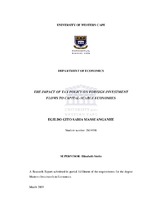The impact of tax policy on foreign investment flows to capital-scarce economies
Abstract
Developing countries all over the world are competing for greater shares of foreign
investment flows in a world where capital has become much more mobile. Also
changes to tax policies have been implemented to make the domestic economies of
host countries more attractive in the eyes of foreign investors.South Africa is an example of a capital-scarce country requiring much higher and more sustainable levels of foreign investment in order to reach the growth target as envisaged by AsgiSA. This problem is exacerbated by the current deficit on the current account of the balance of payments, together with the extremely low rate of national savings.Recent empirical findings indicate that various aspects of tax policy (nominal versus effective rates of company tax, tax incentives, accelerated depreciation allowances,etc) do affect investment decisions and that harmonisation of tax policies is important.It emphasises that tax policy is a very important aspect considered by multinational companies in their investment decisions. It therefore cannot be ignored by policy makers in capital-scarce countries.The study presents an economic appraisal of the South African situation in the context of important lessons which can be learnt from behavioural responses to international tax rules. It finds inter alia that along with other countries, such as Ireland and Singapore, South Africa implemented various changes, such as reducing the nominal and effective rates of company tax. Another example is the recent announcement of
the phasing out of the secondary tax on companies. However, studies also indicate
that, although not a first best solution, the use tax incentives is standard practice
which cannot be ignored. Uncertainty regarding tax policy also seems to impact on
the host country’s ability to attract foreign investment inflows and may even result in disinvestment. A case in point is the recent disinvestment from the South African
mining sector.

